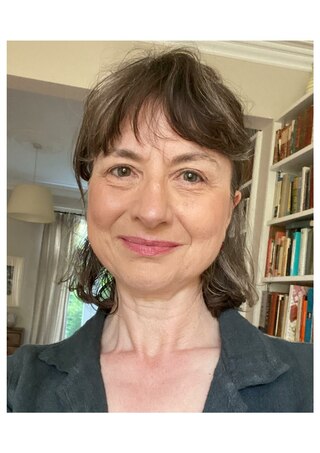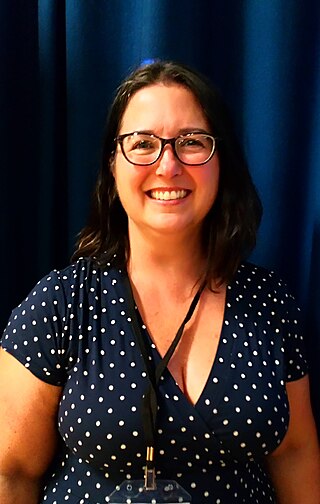
Athena or Athene, often given the epithet Pallas, is an ancient Greek goddess associated with wisdom, warfare, and handicraft who was later syncretized with the Roman goddess Minerva. Athena was regarded as the patron and protectress of various cities across Greece, particularly the city of Athens, from which she most likely received her name. The Parthenon on the Acropolis of Athens is dedicated to her. Her major symbols include owls, olive trees, snakes, and the Gorgoneion. In art, she is generally depicted wearing a helmet and holding a spear.

In Greek mythology, a little owl traditionally represents or accompanies Athena, the virgin goddess of wisdom, or Minerva, her syncretic incarnation in Roman mythology. Because of such association, the bird—often referred to as the "owl of Athena" or the "owl of Minerva"—has been used as a symbol of knowledge, wisdom, perspicacity and erudition throughout the Western world.

Helen King is a British classical scholar and advocate for the medical humanities. She is Professor Emerita of Classical Studies at the Open University. She was previously Professor of the History of Classical Medicine and Head of the Department of Classics at the University of Reading.
In Greek mythology, Pallas was one of the Gigantes (Giants), the offspring of Gaia, born from the blood of the castrated Uranus. According to the mythographer Apollodorus, during the Gigantomachy, the cosmic battle of the Giants with the Olympian gods, he was flayed by Athena, who used his skin as a shield.

Christiane Sourvinou-Inwood was a scholar in the field of Ancient Greek religion and a highly influential Hellenist.

Rosemary Julia Barrow was a Welsh art historian who specialised in classical themes in Victorian art and the painting of Lawrence Alma-Tadema in particular, whose reputation she attempted to restore.
Barbara Graziosi is an Italian classicist and academic. She is Professor of Classics at Princeton University. Her interests lie in ancient Greek literature, and the way in which readers make it their own. She has written extensively on the subject of Homeric literature, in particular the Iliad, and more generally on the transition of the Twelve Olympians from antiquity to the Renaissance. Her most recent research was a project entitled 'Living Poets: A New Approach to Ancient Poetry, which was funded by the European Research Council.

The Department of Classics is an academic division in the Faculty of Arts and Humanities at King's College London. It is one of the oldest and most distinguished university departments specialising in the study of classical antiquity in the United Kingdom.
Jill Diana Harries is Professor Emerita in Ancient History at the University of St Andrews. She is known for her work on late antiquity, particularly aspects of Roman legal culture and society.

Emily Joanna Gowers, is a British classical scholar. She is Professor of Latin Literature at the University of Cambridge and a Fellow of St John's College, Cambridge. She is an expert on Horace, Augustan literature, and the history of food in the Roman world.

Miriam Anna Leonard is Professor of Greek Literature and its Reception at University College, London. She is known in particular for her work on the reception of Greek tragedy in modern intellectual thought.

Rebecca Langlands is Professor of Classics at the University of Exeter. She is known in particular for her work on the history of sexuality and ethics in the Roman world.

Fiona McHardy is a Professor of Classics and also the Head of History and Classics in the School of Humanities and Social Sciences at the University of Roehampton. In 2003 she started work at Roehampton where she was responsible for building up the BA Classical Civilisation. Her research interests include ancient and modern Greek literature, folk poetry, anthropology and culture. She teaches modules on ancient Greek language, literature and culture.
Jane F. Gardner was a British Roman historian, academic, and museum curator. She was emerita professor of Roman History at University of Reading, specialising in Roman law and Roman social history. She was a professor at the university from 1993 until her retirement in 1999, having taught there since 1963. She was curator of the Ure Museum of Greek Archaeology from 1976 to 1992.

Rebecca Futo Kennedy is Associate Professor of Classics, Women's and Gender Studies, and Environmental Studies at Denison University, and the Director of the Denison Museum. Her research focuses on the political, social, and cultural history of Classical Athens, Athenian tragedy, ancient immigration, ancient theories of race and ethnicity, and the reception of those theories in modern race science.

Olakunbi Ojuolape Olasope is a Professor in the Department of Classics at the University of Ibadan in Nigeria. She is an expert on Roman social history, Greek and Roman theatre, and Yoruba classical performance culture. Olasope is known in particular for her work on the reception of classical drama in West Africa, especially the work of the Nigerian dramatist Femi Osofisan.
Sarah B. Pomeroy is an American Professor of Classics.

Emma Stafford is Professor of Greek Culture at the University of Leeds. Her work focuses on Heracles/Hercules and his reception.
Naoíse Mac Sweeney is a British archaeologist, historian, writer, and academic. Since 2020 she has been Professor of Classical Archaeology in the Institute of Classical Archaeology at the University of Vienna.
Rape in Greek mythology is a common motif. The struggle to escape from sexual pursuit is one of the most popular motifs of classical mythology. This type of pursuit and struggle could be those of gods assaulting mortals, or mortals upon other mortals, and less commonly also the attacks of mortals upon gods and gods upon other gods. Other supernatural beings like satyrs and centaurs were often depicted attacking nymphs and maidens. Greek mythology depicts women as vulnerable to assault, able to escape only through death, or metamorphosis like Daphne who becomes a laurel tree. The consequence of fleeing sexual violence is another type of force on the body, the loss of the human form — women who survive sexual violence become pregnant, and when gods are the rapists, produce a hero child.













